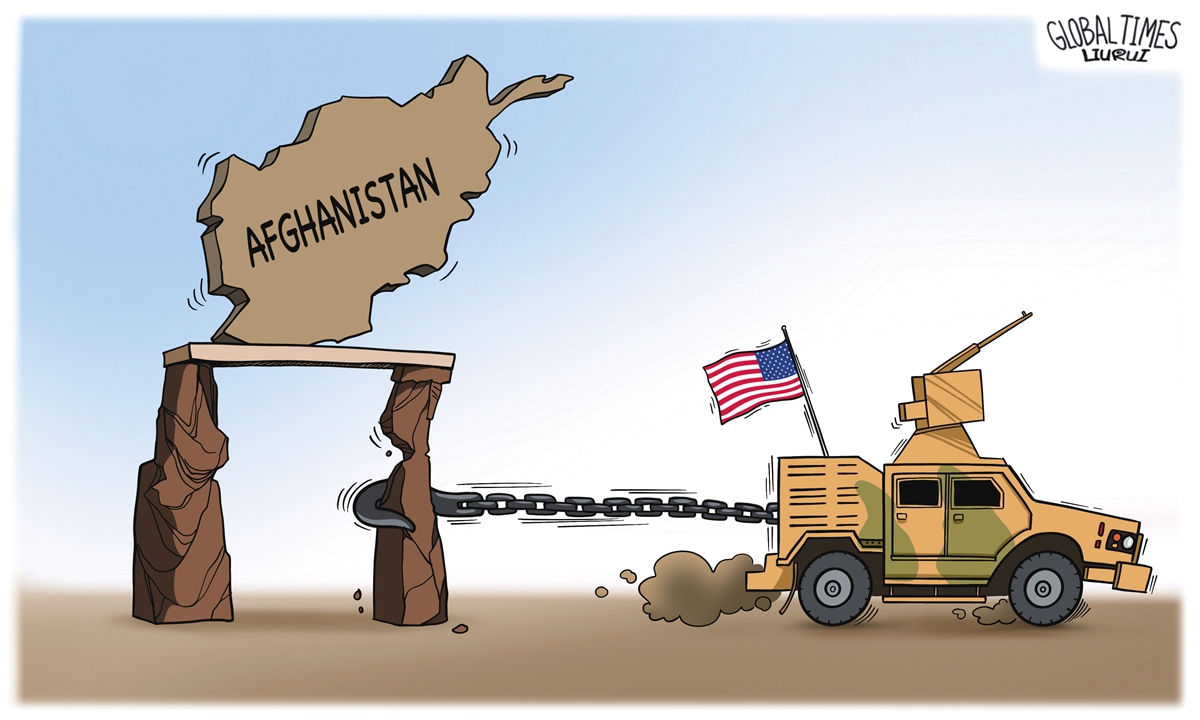Disillusioned by two decades of dreams, discerning ‘10 illusions’ of the US from the ‘Kabul moment’

Illustration: Liu Rui/GT
In 2001, the US entered Kabul, and it was the Taliban who confronted the US. In 2021, the US fled Kabul in chaos, and it was still the Taliban who "sent off" the US. What's different, however, is that the Taliban updated their weapons with captured high-tech American armaments, and has learned from their opposition during the 20 years of US occupation.This Kabul moment is far more dramatic than the Saigon moment of 1975. When the US started the war in Afghanistan two decades ago, its national strength was almost at its peak. But now the US became another superpower lost in the Graveyard of Empires, just like the Soviet Union and Great Britain. As Russian President Vladimir Putin noted, the US is now walking the Soviet Union's path.
Perhaps what the US is most worried about today is that the Kabul moment might just be the first domino to fall down and the first hole of the Broken Windows theory. History never ends. History is proceeding.
The world is undergoing a great change unseen in a century, and the momentum of change is accumulating fast. However, imperialists and hegemonists will never willingly admit their defeat, and will never honestly admit the end of "American mythology". They did their utmost to project the aura of the peak era into the shadow of today's America, and created "10 illusions" for those who yearn for America and fear America. These illusions should be considered in detail.
Illusion 1: America is invincible
Relying on advanced weapons and equipment, the US military killed numerous lives, including those of Afghan civilians, as if the operators of high-tech weapons were "playing video games."
However, in the long term, "weapons are an important factor in war, but not the decisive factor. It is the people, not things, that are decisive." Calculating the strength of the two sides is not a simple mathematical question of comparing GDP, but an analytical problem of political economy.
An economic "star" may indeed be a "black hole" in politics. For example the Wall Street titans may earn a lot, but they are also powder kegs that cause polarization between the rich and the poor, creating national turmoil. America's strength is glamorous, but it is by no means invulnerable, let alone invincible, as the Taliban has confirmed.
Illusion 2: The US could play with the concepts of grand geopolitical strategy at will
The US always boasts of its military supremacy-based strategies, while completely ignores the gap between its capabilities and aspirations.
John Gaddis, an American scholar, pointed out in his book On Grand Strategy that to succeed in geostrategy, you must recognize what kind of restrictions and constraints exist. There is a saying in Sun Tzu's Art of War, "plan before moving, gain something by stopping." Napoleon, who rushed into Russia and eventually lost the war, and Perikles, who blindly pursued hegemony and eventually lost Athens to Sparta, were unwilling to be bound by realistic conditions and stubbornly pursued their overambitious goals, thereby doomed to failure.
Today, the American hegemony is falling apart, as the Economist bluntly points out that the withdrawal of American troops from Afghanistan had demonstrated Biden's "Great Defeat." Under such circumstances, the US is still addicted to playing with a grand geostrategy out of its control, making excuses for the Kabul moment, arguing that withdrawing troops from Afghanistan is a great turn to the grand strategy of the Indo-Pacific, as laid out by former president Barack Obama.
Even if the US does pivot to the Indo-Pacific, regional countries might have to ponder: Will the US run away again as it did in Afghanistan?
Illusion 3: American democracy could heal itself
American democracy has died in Afghanistan, and has been admitted to an intensive care unit in the US. The withdrawal of troops from Afghanistan is not the end of disasters in the past 20 years, but the beginning of an American political civil war in the next 20 years. We saw its origins in the forced storming of Capitol building earlier this year.
Francis Fukuyama said recently that the Afghan crisis marks the end of American hegemony, while the real crisis in the US lies in internal polarization, which will result in almost no consensus on all issues. There is no sign of American democracy healing itself. On the contrary, American democracy has become an accelerator of political division and social confrontation.
Biden came to power in the general election controversy and congressional riots, talking endlessly about vaccination and infrastructure plans, rather than taking care of the American people in their time of great need. Afghanistan issues have hit Biden's approval rate hard, leading the US into a fierce political battle before the mid-term elections. No matter what happens on the US domestic political scene, the current political division in the US will not be the worst seen, it will become worse.
Illusion 4: The US could still do whatever it wants by virtue of its position of strength
People with real strength never talk about strength all the time, but recently the "position of strength" has become the mantra of American diplomacy.
The US made use of its so-called position of strength to engage in unilateral sanctions and "exerting maximum pressure," but all its expected goals have failed. Where there is oppression, there is resistance. Anti-sanction, anti-pressure, anti-bullying. More countries and people are on the way to an era of awakening.
Americans often say, don't "bet on America to lose." This makes America look like an anxious gambler, who wants to win too much but only loses more. The international community is not a casino, and no country would like to place its future and destiny on the roulette wheel.
More peace-loving countries now stand up and say no to the US, and safeguard the morality, conscience and justice of the international community.
Illusion 5: America is 'back'
Biden made a high-profile announcement, "America is back" at the Munich Security Conference in early 2021, trying to create the impression that America is returning to the world stage and intends to expand again. However, the Kabul moment has shown that this was not the case. "America is back" has changed to "America is home." The Republican Party has sarcastically stated: "The Taliban is back, not the United States."
Whether it is the crazy withdrawal from international treaties in the Trump era, or the failure to fight the epidemic, or the withdrawal of troops from Afghanistan, it all confirmed what Czech President Zeman noted, Americans have lost "the prestige of a global leader."
The expansionist America needs to go home, have a physical check-up, and seek remedies while reflecting on its past. On the other hand, the US should engage in true multilateralism, learn to listen and discuss, resort to problem-solving through political dialogue instead of the wanton and futile use of aircraft and artillery.
Illusion 6: The American alliance system has been 'repaired'
The Biden administration expects to create a "Grand West" through its European allies, the Group of Seven (G7), the QUAD mechanism, the "Indo-Pacific Strategy" and the "Summit for Democracy". However, the US did not consult or even inform its allies about before deciding on the hasty withdrawal from Afghanistan. Many Europeans lament that the United States merely treats its allies as a tool.
It is not difficult to tell whether it is "America first" or putting allies interest first. It is the US that forced its allies to revise bilateral free trade agreements on the grounds of trade deficit. It is again the US that hoarded scarce anti-epidemic materials such as vaccines, regardless of the demands of its allies. The fate of its interest-based alliance system is doomed as it will break up upon the exhaustion of interests.
Britain, the devoted supporter of the US in the group, has repeatedly vented its dissatisfaction with the US recently. The British defense secretary expressed the idea that the US was no longer a superpower. Britons may still remember that the US betrayed Britain and dealt the last blow to "the empire on which the sun never sets" during the Suez Canal crisis in 1956. Will history repeat itself? Let's wait and see.
The Anglo-Saxons believe strongly in self-interest. "Every man for himself and the Devil take the hindmost." A man may be stabbed with a knife in the back as soon as it is deemed expedient to do so.
Illusion 7: Universal values are the soft power of the US
"When poor, you get no friends. When rich, you get more friends than you know." The soft power depends on the hard power. When the hard power of the US declined sharply, e.g. at the Saigon moment in the 1970s, it kept a low profile and turned from ideological diplomacy to realistic diplomacy, with Kissinger as the representative.
However, it is different this time. The Biden administration propagated "universal values" vigorously and even arranged the "Summit for Democracy" after the "Kabul moment".
"Universal values" are "luxuries" given to the "third world" by the US. At the moment of severe lack of national strength, the US, unable to fulfill its promise to the followers, has only brought disgrace on itself in Afghanistan.
The Afghans who believed in the commitment of the US for democracy were either abandoned without mercy, fell from airplanes they cling to and died, or became miserable refugees. I'm afraid it will be difficult to reproduce the highlight of "universal values" at the "Summit for Democracy" in December as we still remember the Afghan children murdered in drone strikes.
Illusion 8: The economies will continue to rely unilaterally on the US
The supremacy of the US dollar has created economic dependence on the US. The US frequently abuse other economies by using tools such as tariffs, sanctions or even decoupling when necessary.
However, the epidemic has hit the US economy continuously, and the crazy financial capital injection used as a "cure" has caused the skyrocketing of prices and inflation. The trade war with China revealed the long-standing industrial and financial problems of the United States. The US's deficit with China even rose rather than fell.
More and more countries have begun to enhance their autonomy in economy and finance. A "de-dollarization" movement has begun. Countries have started to reduce their US debts substantially, give up anchoring US dollars, and increase commodity trading in currencies other than US dollars and non-US dollar currency or gold reserves.
The dominance of the US dollar is not guaranteed by sufficient real economy and a gold standard; instead, it is endorsed by national credit. A mudslide of the dollar collapse is not far away when the US Congress continually abuses its credit without any restraint every year.
Illusion 9: America would have the last laugh on epidemic prevention and control
COVID-19 has infected tens of millions of Americans and caused more deaths than the sum of those lost in World Wars I and II, accompanied by more severe social conflicts and crisis.
In the past few days, the daily average number of confirmed cases has exceeded 150,000 consecutively. There have been over 1,000 new fatalities each day, drawing sharp criticism even from its own allies. The European Council decided to take America off the "EU safe travel list" and suggested its member countries take epidemic prevention restrictions against American travelers. Despite "natural disaster" factors at the beginning of the epidemic, America's current situation where a large number of hoarded COVID-19 vaccines still cannot reverse the tide of considerable deaths of its people can only be called a "man-made disaster".
However, America attempts to shirk its responsibility and hide its incompetence by blaming China. It declared that "China's so-called anti-pandemic achievement is the result when authoritarianism defeated "human rights" and China's "Zero-Covid" policy would lead to huge economic costs and would only make itself into an "island isolated from the world".
In fact, the countries imitating American anti-pandemic measures have had to swallow bitter pills. Europe once interrupted their lockdowns against the epidemic and is now suffering from a variant of the virus that is bouncing back. India, passively taking measures for epidemic prevention and control, has been completely trapped in uncontrollable consequences. Vietnam, a country that relaxed its vigilance during the fight against the epidemic, has been faced with tough results.
America may have false hopes that vaccines will save its people from misery, the economy would reinvigorate itself, and it would successfully shirk its responsibility for its repeated mistakes in the fight against the epidemic. Please wake up. The result can only be that, American measures against the epidemic will meet the final failure, American people will be the victims, and the whole world will have to face the resulting consequences.
Illusion 10: America could determine the development of history
30 years ago, the dissolution of the Soviet Union once gave America a reason to cheer. The "end of history" has made America unreasonably believe that it could determine the development of history.
Today, history does not advance straight along the designed route of "end of history", instead it shifts to other paths. Today, America stands against global trends of history, and heads towards a mirage of ideology built on hegemonism and neoliberalism. The "American myth" has been stricken by a financial crisis, Donald Trump's failed administration, failure in the anti-epidemic fight, riots on Capitol Hill, defeat in Afghanistan, and America has arrived on the brink of an edifice falling apart under the weight of its own dreams.
It should be remembered, America's historical view was built on its short story of 250 years, and thus it has no concept of "sunset", only "sunrise". There has never been any era of America solely. America was, is and will be only a country in the era.
The author is an observer on current affairs. opinion@globaltimes.com.cn



